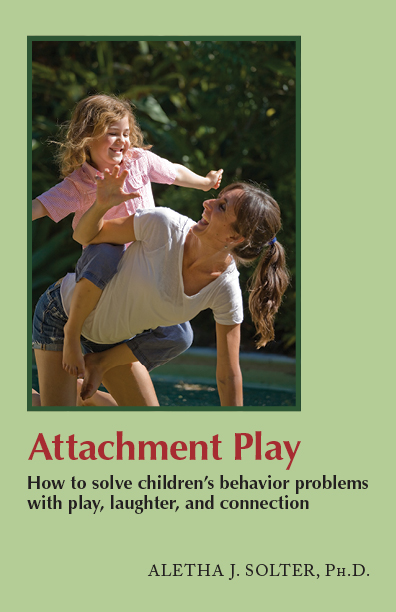Five-year-old wants to sleep with parents
by Aletha Solter, Ph.D.
Question:
I am remarried with three stepsons and one daughter (from my first marriage). My husband and I have a wonderful relationship except for one issue: my daughter wants to sleep with us!!! She is five years old, and she constantly crawls into bed next to me at night. I went through a difficult divorce, and she is extremely close to me and her stepfather. But he sees it as a "me or her" type of situation, causing me to be in a terrible spot.
1) How do I explain to my daughter why she has to sleep alone when I don't? I've tried explaining how special her own room is and how lucky she is to have it, but she wants to sleep with me!
2) How do I deal with her crawling into bed with us? My husband is totally against it, and he has even left the room and slept in another room when he notices she has crawled in next to me. This is putting a wedge into our relationship. Is there anything wrong with her joining us in bed a few nights a week? (It doesn't happen every night.) He firmly believes she will not be able to learn to put herself back to sleep if she continually joins us whenever she wakes up. I think she just needs some extra tender loving care.
Answer:
In my opinion, there is nothing wrong with letting children crawl into bed with their parents. Babies and young children have a legitimate need for closeness during the night, and I recommend letting them sleep with their parents until they reach an age at which they no longer request this. We humans are the only land mammals that force our young to sleep alone. Separate sleeping arrangements are a recent practice found only in technologically advanced cultures. As a result, many chilren in these cultures grow up deprived of sufficient physical contact and are starved for affection. Sleeping alone is not natural for young mammals, and human children seem to know this very well! The more their need for physical contact is met when they are little, the more loved and secure they will feel, and the less likely they will be to seek superficial sexual relationships as adolescents in order to meet those unfilled needs.
When children sleep in a separate room, it is common for them to come to their parents' bed sometime during the night. This is more likely to occur during periods of high stress such as starting a new school or following some traumatic event. If your divorce was traumatic for your daughter (and most divorces are traumatic for the children), then it is only natural that she will seek reassurance and closeness during the night. You are her stable base during this vulnerable time of change in her life, and she wants to make sure that you are there.
Unfortunately, many men are opposed to children sleeping in the parents' bed, and they want their wives all to themselves. I think that this attitude stems partly from the fact that most men were denied sufficient closeness to their mothers when they were little children, and they expect their wives to fill this void. It all becomes tied in with sexual desire. But if a man had benefited from sufficient early physical contact with his mother, he would be relaxed and flexible about his sexual relationship with his wife, and he would be willing to take the needs of the children into account. He would probably feel no jealousy or resentment of the children when his wife tries to meet the children's legitimate needs for attention and closeness.
Your particular family situation is even more difficult for your husband than for other men because he is not the biological father of your daughter, so he probably does not feel as close a bond to her as you do. His position is certainly understandable. After all, he married you, not your daughter! Considering all these factors, it is only natural that he would feel some resentment of your daughter's presence in bed.
However, it is not right for your husband to force you to choose between your child's needs and what he perceives as his own needs. I recommend that you have a heart-to-heart discussion with him, telling him how you feel about making such a difficult choice. Reassure him that you love him (as well as your daughter), and that you want to be the best possible wife and mother. Be sure to listen well to him and to acknowledge whatever feelings or needs he expresses. Encourage him to talk about his childhood and his relationship with his own mother. This might bring some insights to light that will help both of you to understand his current feelings.
I am not implying that parents should sacrifice their own legitimate needs for intimacy with each other. But the children's needs should not be overlooked either. With open communication, it is often possible to find workable solutions where everybody's needs are met. When your daughter climbs into bed with you at night, a compromise solution might be to bring her back to her own bed, but to lie down with her until she falls back to sleep. Or you could agree as a family that she can come into your bed one or two nights a week, and on the other nights, you will accompany her back to her own room. Another idea is to spend occasional special nights with your husband away from home.
Your daughter needs you now, but this intense need will not last forever. If you fill your daughter's need for nighttime closeness, she will gradually regain a sense of security and no longer need this. You do not say whether she was allowed to sleep with you as an infant. If not, she may be "catching up" on the holding that she missed earlier. I suggest that you provide her with plenty of holding and cuddling during the day and also at bedtime. This might reduce her need for closeness later on during the night.
Another thing you can do is to help her express her feelings about your divorce. Be open to letting her release feelings of sadness, fear, anger, or rage. Some of it might be directed at you or at your husband or her biological father, and that would be a healthy outlet for her. You can also reassure her that you love her dearly, and that you will never, ever, abandon her.
About Aletha Solter:
Aletha Solter, PhD, is a developmental psychologist, international speaker, consultant, and founder of the Aware Parenting Institute. Her books have been translated into many languages, and she is recognized internationally as an expert on attachment, trauma, and non-punitive discipline.
Aware Parenting is a philosophy of child-rearing that has the potential to change the world. Based on cutting-edge research and insights in child development, Aware Parenting questions most traditional assumptions about raising children, and proposes a new approach that can profoundly shift a parent's relationship with his or her child. Parents who follow this approach raise children who are bright, compassionate, competent, nonviolent, and drug free.

